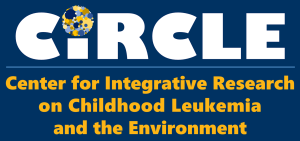CIRCLE Interviews Dr. Matt Rushford
Dr. Matt is a pediatric chiropractor, the father of a childhood leukemia survivor, and the founder of the StormStrong Foundation.
The StormStrong Foundation is dedicated to funding preventive, proactive research and education to reduce the incidence of pediatric cancer. He and his wife, Julieta, started the foundation as a way of paying forward the countless acts of kindness and generosity they received after their son, Storm, was diagnosed with Acute Lymphoblastic Leukemia.
Read about his experience with his son’s cancer, from diagnosis to treatment to future prevention, and how this has inspired him and his family to create the StormStrong Foundation.
With which cancer was your son diagnosed? What was your initial reaction when you heard the diagnosis?
Our son was diagnosed with Very High Risk B-type ALL on July 17, 2017. Since I have worked with leukemia patients in my practice, I was familiar with the presentation that leads to a diagnosis – the lethargy, tiredness, etc. – and in fact, that’s why I insisted on taking him to the urgent care for a quick blood draw. But there is nothing that can prepare you for hearing that your child has cancer.
The floor drops out from under your feet, the room spins, your previous life, well, it ends, really.
Nothing is ever the same.
What kind of support did you need during this time?
The support we needed at this time was substantial – from the practical help of taking care of the dog and organizing a meal train, to the emotional support of holding us up when it seemed impossible to stand. I honestly don’t know how someone could endure this without the kind of friends and family we have.
What are some of the challenges your family faced during and after your son’s treatment?
The elements of treatment that are most enduring are certainly the moments when he was in the greatest peril, fear, or pain. He suffered repeated sustained anaphylactic reactions to the I/M peg-asparaginase, neurotoxic stroke and paralysis, kidney stones, kidney failure, and double pneumonia with lung collapse that had him in intensive care for 3 weeks, barely able to breathe. When I recall that time, I can only remember the pure, unmitigated terror, grief, and sorrow I felt every moment.
We’re still in treatment, so we haven’t reached the “after treatment phase”. I look forward to those challenges. Long Term Maintenance is entirely tolerable, even if it is like reopening a wound once a month. He feels and looks good and has few issues with the treatment sessions. Probably the biggest challenge right now, and I imagine moving forward, is PTSD – troubled sleep, constant worry, panic attacks.
What were some ways you found to support your son emotionally and/or physically during his treatment?
The most important thing in supporting our son through this journey was to find the balance between honesty, grief, optimism, faith and humor. Each element has its place and time: it is critically important to have faith and optimism, but there are times when you have to allow yourself to break down, and he needs to know that he can, too. At the same time, you can’t be a constant puddle of sorrow on the floor. Humor has been central to our survival, but if overused, it can be an avoidance crutch. For the most part, we let him guide us.
What would you suggest to other parents going through this?
“Lean on your friends and family. Ask for help. Pray. And fasten your seatbelt.”
Did your child’s diagnosis change your outlook on life?
Well, it didn’t change my values or my beliefs, but it definitely changed my perspective. Things that used to seem important now seem trivial, and things that I didn’t pay as much attention to – family, friends, community – are much more important to me now. It’s not all sunshine and roses, though. I find myself much more fiercely protective of my son in terms of fairness and equity – he’s had so much taken away from him I think I am hyper vigilant about making sure nothing else is unfairly withheld from him.
Looking back, did you find resources on what causes childhood cancer readily available?
We found no sources on what may have caused our son to get cancer, or causes for any cancer in general.
When we asked our son’s oncologist how he got cancer, she just shrugged and shook her head.
As I’ve told people countless times, ask your doctor to tell you everything they know about diagnosis and treatments for leukemia and you’ll be socked in for weeks. Ask them what they know about what causes it and you’ll barely get through half of your small cup of coffee.
We found this extremely frustrating.
When we looked around for sources of information on the causes and prevention of leukemia, we found virtually nothing, except groups like CIRCLE.
What is the mission of your foundation?
We founded the StormStrong Foundation, named after our son, who has inspired us time and time again with his strength and fortitude as he has faced his cancer battle.
The mission of the StormStrong Foundation is to focus attention on and recruit support for efforts at better understanding the causes of childhood cancer, and particularly leukemia, and the development of evidence-based action steps that will reduce the rate of incidence of childhood cancer in the form of prevention-based measures, including addressing the sources of environmental triggers for cancer.
What from your experience inspired you to create this foundation? What makes your foundation different from other cancer foundations?
When we looked at cancer charities, we discovered that not one major cancer nonprofit has a preventive focus. Not one. So when we reached, as many families do, the point where we could breathe again, and felt, as we feel, compelled to give back, to help others, we naturally were drawn to the gaping void that is prevention research.
Our foundation is quite unique: most cancer charities focus on treatments, therapies, and post-diagnosis support – in other words, waiting until some poor child is diagnosed, then pouring on the care in the form of expensive and traumatizing therapies and comfort and support for the family. The StormStrong Foundation is one of the few cancer charities that is seeking to reduce the incidence of pediatric cancer, and leukemia specifically. We want to help reverse the current trend of increasing rates of pediatric cancer. We think that Americans have accepted a disturbingly fatalistic approach to cancer, resigned to accept the notion that nothing can be done to prevent it. We refuse to accept that fallacy.
We are excited to work hard to raise funds and resources to be directed towards research collaborative like CIRCLE that can effectively work towards answering the big questions about pediatric cancer and initiate action steps towards educating the public about their findings. If we can save just one child from a cancer diagnosis, it will be worth it. No one knows that better than us.


